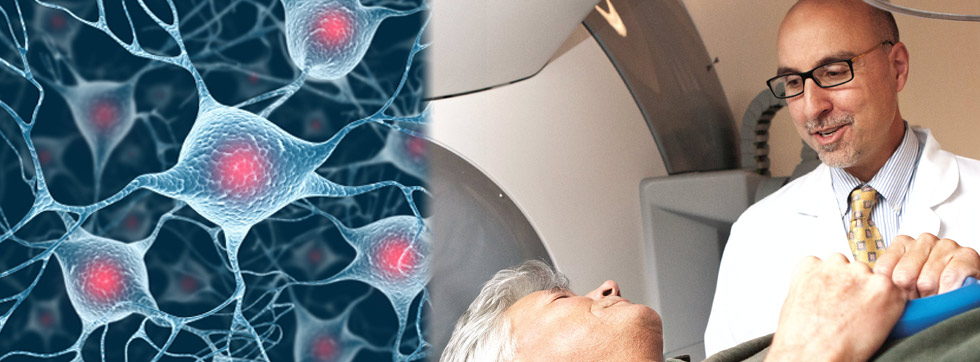Cancer Specialty Areas

The Department of Radiation Oncology at UC Davis Comprehensive Cancer Center offers state-of-the-art technology and treatment methods, along with the expertise of highly trained and experienced professionals, to provide the highest quality patient care in Northern California.
We provide a variety of site-specific treatments along with specialized treatment procedures:
UC Davis Department of Radiation Oncology treats both malignant brain cancer and benign tumors. For malignant cancers, the main treatment is fractionated radiation therapy — smaller doses of radiation given over time until the cumulative dose is reached. Benign tumors may be treated with fractionated radiation or with radiosurgery. Treatment may or may not be concurrent with chemotherapy. Special attention is paid to protecting vision, hearing and other nearby critical brain structures.
Treatment technologies include Gamma Knife or Intensity Modulated Radiation Therapy (IMRT). Image Guided Radiotherapy (IGRT) helps the team confirm proper daily setup of head and structure line for further protection.
An expert radiation oncology team works in close collaboration with highly skilled neurosurgeons, medical oncologists and ear, nose and throat (ENT) physicians to provide the best and most up-to-date treatment possible.
The following UC Davis radiation oncologists specialize in treatment of these cancers:
We treat all stages and types of breast cancer in the UC Davis Department of Radiation Oncology. Our philosophy is a multi-disciplinary approach that provides top-notch treatment with a focus on comfort and safety of patients. Along with expert physicians and technicians, our breast cancer radiation team includes a dedicated breast nurse, a nutritionist and a social worker.
Therapies include whole-breast radiation, chest-wall radiation or partial-breast radiation. Two main types of treatment are available: external-beam radiation and partial-breast radiation. In both cases, 3-D conformal may be used. In addition, partial-breast treatment may include catheter-based radiation — an outpatient therapy that places the radiation source inside the lumpectomy cavity, delivering the radiation to the area where cancer is most likely to recur.
The following UC Davis radiation oncologists specialize in treatment of these cancers:
Thanks to a renowned and dedicated program that focuses on comprehensive treatment for the whole patient, the UC Davis radiation oncology team treats a high volume of gynecological malignancies. The interdisciplinary team includes physicians, technicians, a gynecological nurse, a nutritionist and a social worker who work diligently to communicate with each other and the patient to provide the best therapy.
The treatment plan incorporates the latest technology, including external beam radiation therapies (such as intensity modulated radiation therapy [IMRT], 3-D conformal and image-guided radiotherapy [IGRT]) and HDR brachytherapy (radioactive seed implantation that offers highly-precise radiation to the tumor). As part of their whole patient philosophy and to assure the best long-term outcome, the team takes great care to monitor patients even after treatment is completed.
The following UC Davis radiation oncologists specialize in treatment of gynecological cancers:
There are multiple ways to approach cancers of the colon, rectum and anus — radiation therapy plays a major role in much of that treatment. At UC Davis, radiation treatment can be used at several stages, including pre-operative, post-operative, and/or in combination with chemotherapy. In all cases, the focus is on a team approach, integration of therapies, and use of the latest technology as well as available clinical trials.
At UC Davis, the main technologies used to treat colorectal cancers include intensity modulated radiation therapy (IMRT), image-guided radiotherapy (IGRT), and 3-D conformal radiation therapy. UC Davis offers TomoTherapy, a state-of-the-art IMRT technology that provides more accurate treatment and better tumor control.
The following UC Davis radiation oncologists specialize in treatment of these cancers:
Tumors involving the head and neck represent a therapeutic challenge due to their proximity to critical organs such as the brain, spinal cord, eyes, ears, and salivary glands, as well as their tendency to present at locally advanced stages.
The UC Davis Department of Radiation Oncology takes a multi-disciplinary team approach with multiple experts and dedicated nursing support when treating cancers of the head and neck. While radiation therapy may be used in conjunction with surgery and/or chemotherapy, it is often the primary treatment since it helps preserve nearby tissues critical for speech, swallowing and appearance.
Dedicated to the long-term, best outcome for head-and-neck cancer patients, UC Davis also has an active program to treat second-course cancers that come back after the initial therapy. The team of experts at UC Davis has published extensively on their experiences using advanced technologies, including intensity-modulated radiotherapy (IMRT) and image-guided radiotherapy (IGRT) when treating cancers of the head and neck. In the hands of our skilled practitioners, these technologies have the ability to deliver radiation with pinpoint precision and accuracy to ensure treatment success.
The following UC Davis radiation oncologists specialize in treatment of these cancers:
For leukemia and lymphoma cancers, UC Davis takes a multi-modality approach to provide patients with the best chance for survival. This method may combine radiation therapy with chemotherapy, surgery and/or bone marrow transplant. The expert team also draws on clinical trials when available.
Treatment may include active bone marrow transplants with total body irradiation (TBI – delivering radiation to the entire body to destroy cancer cells prior to bone marrow transplant), total node radiation (delivering radiation to all lymph nodes to control spread), or 3-D conformal radiation therapy.
The following UC Davis radiation oncologists specialize in treatment of these cancers:
For lung and esophageal cancers, radiation therapy is a critical tool to effectively target the tumor, but spare nearby organs and tissues. At UC Davis, the radiation oncology team works in close collaboration with other medical specialists since treatment for these cancers often include a combination of radiation, surgery and/or chemotherapy.
The primary radiation treatment methods include 3-D radiotherapy, intensity-modulated radiotherapy (IMRT), image-guided radiotherapy (IGRT), and endobronchial brachytherapy. In some additional cases, the use of stereotactic body radiotherapy (SBRT) is utilized as an alternative to surgery to deliver a large dose of radiation to a highly conformal region to ablate lung tumors. The UC Davis radiation oncology team also uses a state-of-the-art, 4-D gated tracking system to optimize targeting and real-time tracking of mobile tumors.
The following UC Davis radiation oncologists specialize in treatment of these cancers:
At UC Davis, the radiation oncology team takes an aggressive stance to control metastatic cancers (disease that has spread from its original site to another area — primarily to the bone, liver, lungs or brain). Radiation therapy is also an important tool to relieve the symptoms associated with metastatic cancer.
Treatment for these cancers may include gamma knife radiosurgery and stereotactic body radiation therapy (SBRT) to eradicate cancer cells.
The following expert UC Davis radiation oncologists specialize in treatment of these cancers:
Pediatric cancer is best approached with a team of specialists. At UC Davis, we have an active program treating various kinds of childhood cancer, working closely with pediatric medical oncologists and surgeons. Special attention is paid to minimizing side effects so these small patients have the best possible chance for positive psychological and physical development. To that end, the radiation oncology team emphasizes state-of-the-art treatment according to leading national clinical trials and the use of the most sophisticated systems.
Treatment methods for pediatric cancers include IMRT tomotherapy, rotational arc therapy (VMAT) and stereotactic body radiation therapy (SBRT).
The following expert UC Davis radiation oncologists specialize in treatment of these cancers:
There are many different levels of prostate/genitourinary cancers, and at UC Davis our team of nationally-recognized radiation oncologists assure that treatment is tailored to each patient’s particular cancer, and that the latest technology in the field is utilized.
Men who are diagnosed with prostate cancer frequently have disease that is localized to the prostate, and radiation therapy can be potentially curative in these cases. Treatment technology for these cancers may involve external beam radiation with intensity modulated radiation therapy (IMRT) or internal treatment with prostate brachytherapy (radioactive seed implantation). Radiation treatment may also be an effective tool after an operation such as robotic prostatectomy. When radiation is used after surgery, treatment can frequently improve survival rates.
The following UC Davis radiation oncologists specialize in treatment of these cancers:
Radiation is often used in the treatment of sarcomas in combination with surgery, with or without chemotherapy. The radiation oncology team pays particular attention to providing treatment that will improve patient survival or longevity with minimal side effects. Clinical trials may also be available for patients. The treatment technology for these types of cancers is primarily intensity modulated radiation therapy (IMRT), an advanced technology that has reduced side effects and improved tumor control.
The following UC Davis radiation oncologists specialize in treatment of these cancers:
Radiation is often used in the treatment of aggressive skin cancers (e.g. Squamous cell, Basal cell, Merkel cell, Melanoma). The radiation oncology team pays particular attention to providing treatment that will improve patient survival or longevity with minimal side effects. Clinical trials may also be available for patients. The treatment technology for these types of cancers can include intensity modulated radiation therapy (IMRT), an advanced technology that has reduced side effects and improved tumor control, electron therapy, or HDR surface brachytherapy. We have developed state-of-the-art technologies such as advanced 3D printing that can be beneficial for complex clinical cases.
The following UC Davis radiation oncologists specialize in treatment of these cancers:
Radiation is most typically used to manage stomach and pancreatic cancers after surgery, with or without chemotherapy. In addition, radiation therapy is also a useful method for alleviating pain and suffering. The radiation oncology team pays particular attention to providing treatment that will improve patient survival or longevity with minimal side effects. Clinical trials may also be available for patients.
The treatment technology for these types of cancers is primarily intensity modulated radiation therapy (IMRT) with tomotherapy, an advanced technology that has reduced side effects and improved tumor control.
The following UC Davis radiation oncologists specialize in treatment of these cancers:





